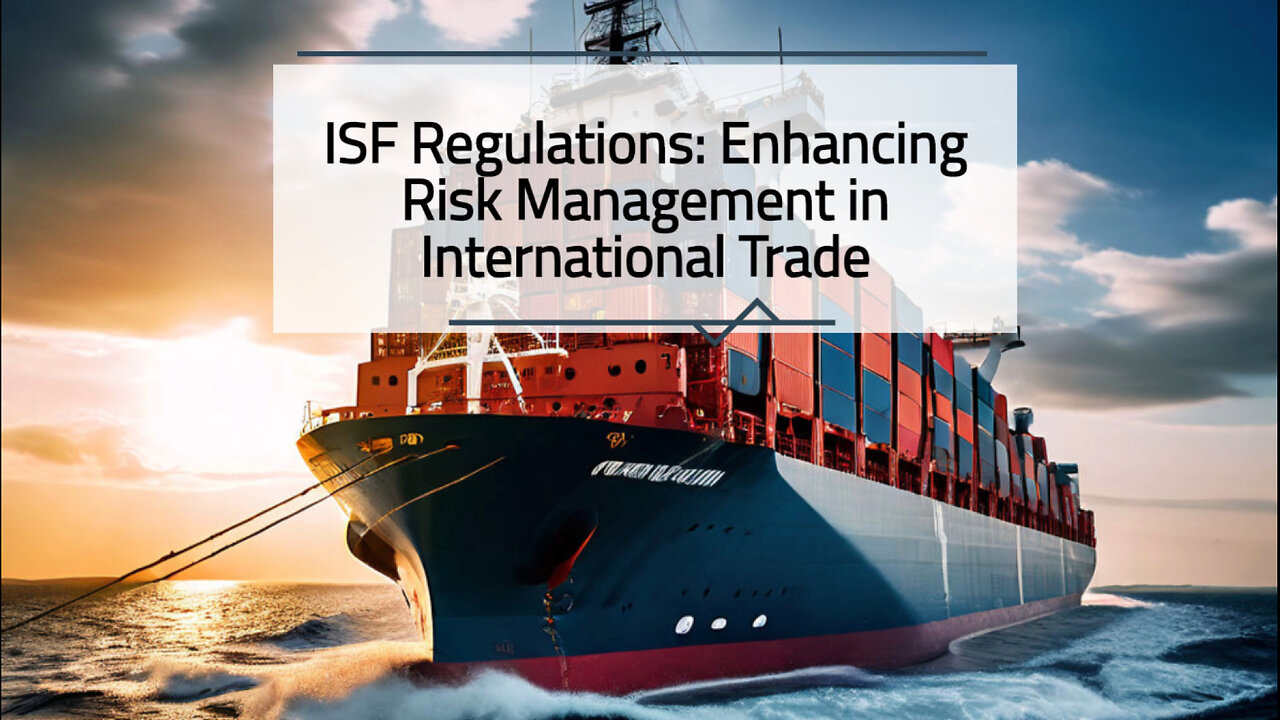Premium Only Content

Unveiling Importer Security Filing: Managing Risk in International Trade
ISF Checklist || 805-970-7918 || contact@isfchecklist.com || www.isfchecklist.com
This video discusses the importance of understanding Importer Security Filing (ISF) regulations from a risk management perspective. ISF is a mandatory submission of information required by US Customs and Border Protection for cargo arriving via ocean vessel, aiming to enhance security and improve risk management in the international supply chain. By understanding ISF regulations, importers can identify and address potential risks, reducing delays, penalties, and financial losses. Timely and accurate filing of ISF is crucial, as failure to comply can result in penalties and shipment delays. Customs brokers play a significant role in the ISF process, helping importers navigate customs regulations and ensure compliance. Additionally, importers may need to obtain a customs bond to ensure payment of duties and obligations. Understanding ISF regulations allows importers to assess and mitigate risks, enhance supply chain security, and facilitate the smooth flow of goods across borders.
#usimportbond #isfcustomsbroker #uscustomsclearing #isfentry
Video Disclaimer Here: This video is purely educational and has no ties with the US government.
00:22 - Importer Security Filing (ISF) regulations are mandatory submissions required by US Customs and Border Protection (CBP) for ocean vessel cargo to enhance security and improve risk management in international trade.
00:59 - Understanding ISF regulations from a risk management perspective helps importers identify and address potential risks in their supply chain, reducing the chances of delays, penalties, and financial losses.
01:22 - Timely and accurate filing of ISF data at least 24 hours prior to the vessel's departure is crucial to avoid penalties and shipment delays, with customs brokers playing a significant role in ensuring compliance and streamlining the filing process.
01:51 - Compliance with ISF regulations, along with obtaining a customs bond, allows importers to proactively assess and mitigate risks, enhance supply chain security, and facilitate the smooth flow of goods across borders.
-
 LIVE
LIVE
JuicyJohns
4 hours ago $0.29 earned🟢#1 REBIRTH PLAYER 10.2+ KD🟢
355 watching -
 LIVE
LIVE
Rethinking the Dollar
32 minutes agoPowell Caves: The MAGA Wealth Effect Begins NOW! | Morning Check-In: Let's Talk...
89 watching -
 LIVE
LIVE
The Shannon Joy Show
16 hours ago🔥🔥 Shannon Joy’s Week in Review: August 22, 2025 🔥🔥
905 watching -
 LIVE
LIVE
Trumpet Daily
27 minutes agoTrumpet Daily LIVE | Aug. 22, 2025
350 watching -
 1:01:21
1:01:21
VINCE
3 hours agoThe FBI Is Putting The Deep State On Notice | Episode 109 - 08/22/25
121K124 -
 12:39
12:39
Nikko Ortiz
1 hour agoLive - News, Politics, Podcast And Naaah Im Playin We Chillen
7.53K1 -
 LIVE
LIVE
LFA TV
8 hours agoLFA TV ALL DAY STREAM - FRIDAY 8/22/25
5,953 watching -
 LIVE
LIVE
Caleb Hammer
1 hour agoGirl Math Final Boss | Financial Audit
112 watching -
 1:09:50
1:09:50
The Big Mig™
3 hours agoTrump, Are You Tired Of Winning
16.5K11 -
 1:54:15
1:54:15
Dear America
4 hours agoLetitia James $527M NY Case Against Trump DROPPED!! + Trump Patrols With National Guard In DC!
124K31